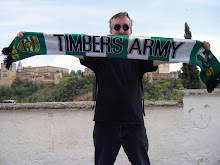It Needs a Longer End Credit Sequence: The Wild Bunch (1969)
I wasn’t trying to make an epic. I was trying to tell a simple story about bad men in changing times. The Wild Bunch is simply what happens when killers go to Mexico. The strange thing is that you feel a great sense of loss when these killers reach the end of the line.
-- Sam Peckinpah
Sam Peckinpah’s The Wild Bunch is playing in town at Cinema 21, so Lynda and I shuffled down the street to experience it in the theater. Although we’ve both seen it on the big screen before, it’s a hard film to pass up. Cinema 21 is showing the 144-minute version, which reinstates some flashback sequences and the scene when Villa’s rebels attack Mapache (Emilio Fernandez), and his troops. If you’ve never seen this film, I urge you to check it out, even if you don’t like Westerns. Hell, especially if you don’t like Westerns. From its simple yet dynamic narrative to its revolutionary cinematic syntax (especially for the genre) to the twilight moral universe of killers and victims that Pike (William Holden) and The Bunch exist in and that we, the audience, are forced to submit to –- this is cinema of the highest order. Many have copied and ripped it off (e.g. Brian De Palma, Walter Hill, Paul Schrader, Oliver Stone, Robert Rodriguez, and John Woo, to name only a few culprits), but none of them have ever equaled the monstrous force or moral complexity that comprises Peckinpah’s film. Basically, The Wild Bunch are the only men in a town of boys. Christopher McQaurrie’s 2000 neo-noir, The Way of the Gun, paid splendid homage to The Wild Bunch and is probably the best of the newer crop of films inspired by Peckinpah’s legacy, although it nevertheless lacks the seriousness of Peckinpah’s film. In the end, it’s still a cartoon. A fiendishly good one, but a cartoon nonetheless. But off the top of my head, Clint Eastwood’s Unforgiven (1992) is arguably the only other Western that comes close to matching the emotional and moral weight of The Wild Bunch.
It’s 1912 and World War One is looming on the horizon. The American Old West is dying out and with it, the violent men who helped shape, tame, and define it. Pike Bishop, Dutch Engstrom (Ernest Borgnine), Lyle Gorch (Warren Oates), his brother Tector (Ben Johnson), and Angel (Jaime Sanchez) are looking for one more big score after their attempt to rob a bank in the town of Starbuck went horribly wrong when Deke Thornton (Robert Ryan) and his crew of bloodthirsty bounty hunters ambushed them. Barely making it out alive of the melee, Pike and his gang of killers regroup and end up working for a corrupt Mexican general, Mapache, to steal a shipment of U.S. military guns and ammo, while Thornton and his posse of cut-throats are riding hard on their trail.
Even thirty-five years after it was first released, the violence in The Wild Bunch is still ferocious and shocking. Between this and Arthur Penn’s ode to lawlessness and pop-art criminality, Bonnie and Clyde (1967), never had a film so ruthlessly propelled the audience into the topsy-turvy moral universe of its characters; never had a film so thoroughly abandoned its audience and not given them a character to root for and bad guys to hiss at. There are no Good Guys and Bad Guys in this film -- only killers and prey. Remarkably, Peckinpah manages to make us feel and mourn for The Bunch when they go down at the end in a hail of apocalyptic rage and bullets, but it comes attached with plenty of moral dilemmas and a bitter taste in our mouths. Like the character The Judge said in Cormac McCarthy’s masterpiece, Blood Meridian, there are “Bears that dance, bears that don’t.”
When the film ended and the house lights went up, Lynda leaned over to me and whispered, “The film really needs a longer end credit sequence.” I looked into her weary eyes, scanned the theater around me to see others who were still seated looking equally worn out and wounded by what they’d just witnessed, and nodded my head. Bears that dance and bears that don’t. Indeed.

No comments:
Post a Comment